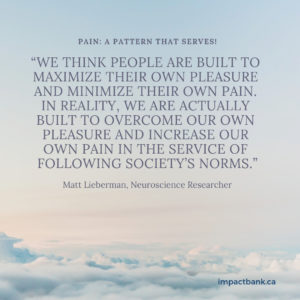Belonging is costly AND YET we appear willing to pay whatever is asked. The price is usually social pain. You give up who you really are to “fit in” and eventually it’s invading your thinking and embedding itself in your behaviour as well as the results you’re producing in your life.
This week’s theme is social pain. It’s a complex subject. Sometimes even sounding contradictory. On one hand, we’re motivated to belong to eliminate social pain and on the other, we need to belong so much we’ll endure a great deal of pain. Once you examine its impacts in your own life, as is so often true, the complex starts becoming clear.
The podcast episode is highlighting one of the six patterns, also suggesting how you may begin examining and potentially reducing the toll it takes. In this post I lay out all six and offer three suggestions for how to mitigate their influence. The Instagram video posted on November 28th contains a story illustrating how one person risked her sense of belonging externally in search of greater sense of belonging internally. Additionally, in the newsletter I offer more ideas AND share a story I heard this week on Amanpour & Co. The story beautifully illustrates my point on why this is so complex. In the blog post I’m attempting to bring it all together.
Post Script Note
Interestingly, I’m adding this note as I’m realizing this post will be a bit later than my typical schedule because I’m experiencing an example of exactly this experience in the week of this theme. I may share the details of the experience in an upcoming episode. However, it’s ongoing so reflection with a bit of distance may be wise. 🙂
What’s Belonging?
Belonging is a term used throughout the post. It’s also a key benefit associated with engaging with my system, so defining it makes sense.
Belonging is such a fundamental human motivation that we feel severe consequences in its absence. If it wasn’t so fundamental, lack of belonging wouldn’t carry such dire consequences. This desire is so universal that the need to belong is found across all cultures and different types of people. Maslow, in his hierarchy of needs, suggests the need to belong is a major source of human motivation. He thought that it was one of 5 human needs, along with physiological needs, safety, self-esteem and self-actualization
Informing my system and approach, Roy Baumeister, who seems to go further than Maslow in his conclusions, is saying much of what human beings do, is in service of belonging. Baumeister along with most social researchers, is arguing that many other human needs are driven by the need as well. This is the foundation for the research demonstrating social pain is powerful because of the way it challenges this fundamental human need to belong.
Pain: Physical & Social
It turns out the circuits in the brain processing pain are virtually the same for both physical and social pain. That basically means that when you’re feeling left out or insulted, your brain processes it in the same way as it does when you’re punched. Interestingly, it may have longer lasting effects on you than the physical discomfort of a punch.
Precisely because of the impact social pain can have, you may be easily brought into submission by the culture you grow up in, work in, or live in. You’re wired to desperately need to belong. When do you find yourself adjusting your behaviour to ensure you’re not facing ridicule or a type of shunning from within a group you cherish or are wanting to retain in your life? Perhaps you’re accepting the pain of giving up something that’s important to you personally, hoping to maintain order or peace in your external environment.
Pain: the Evolutionary Reason for Social Pain
Why are we programmed to be so sensitive to rejection or insult? It really is quite beautiful and simple. Humans are not the strongest, quickest or most sensorially attuned creatures on this planet. As a result, we benefit from banding together in communities. Historically collaborating in raising children, fending for food and protecting each other from physical harm has been common. First, we needed protection from other animals and eventually, after connecting up into tribes, protection from each other.
Being in service to others is beautiful. We revere those who are willing to make sacrifices in service to their community, nation or family. The rituals and reverence we apply to sacrifice, makes it extremely difficult for anyone to speak against something related to it. Recent examples include the issue made of those kneeling for the US national anthem or taking a conscientious objector status to war as Mohammad Ali did. These acts of personal belief or conscience ARE examples of people exercising courage to challenge the “norms” and demands from society calling them to accept personal pain in service of following society’s norms. Have any of you chosen a career track because you sought your parents approval? OR perhaps you’re raising your status by excelling in a profession that’s providing power or wealth? Regardless of what you tell your self, many of the big “choices” you’ve made were deeply influenced by how they made you appear to the external world. What if you instead started listening to your own inner desires and hopes and dreams? What would be different in your life? You may find listening to the story I tell on the Instagram video on November 28th interesting. It’s an example of a young trans woman, in the 90’s, who was wise enough to risk what could alienate her from many but would align her with her true self. THAT’S COURAGE.
Pain: the Patterns
Social pain will typically impacts most deeply when the threat falls into a few domains. The first is measuring how included you feel. The second is focusing on whether you’re kept “in-the-loop”. The third speaks to whether you’re feeling you have options and a choice in what’s happening around you. The fourth is about whether you feel valued for who you are. The fifth AND, perhaps the most powerful, is whether you feel like you or those around you are being treated fairly.
The domains are a way of categorizing or organizing and defining the source of the pain. The reactions to each domain may differ by person or situation. Never the less, each person may feel more ‘triggered’ by one or another of the domains. Working with a coach, unpacking situations and better understanding how you’re affected, will be very useful, if you want to maintain healthy self-regulation skills. Without a strategy, you’ll find your self reacting to the pain in unhealthy ways, most of which are outlined below.
Pain: The Six Patterns of Behaviour
In the podcast episode this week I decided to highlight the first element in the list of the six most common effects of feeling threatened by social rejection and pain. You’ll find the entire list and a brief description of each below.The degree to which you experience them will make you more sensitive to the experience and increase the number of elements you experience and the significance of the patterns that grow.
- Experiencing a drop in your intelligence and reasoning skills is a common threat response. In other words, when feeling something is dramatically unfair, you may feel confused and overwhelmed. Sometimes this is referred to as fuzzy thinking.
- Your reaction may create difficulty in regulating your emotions. Resulting in you finding your self being inappropriate or uncivil when you are angered or provoked. Your threat response is impairing your social regulation and, in time, it will hurt relationships.
- Some people’s reaction is to reduced their ability to engage with others at all so it will reduced your social behaviours. You may isolate your self, thinking if others aren’t going to include you, you’ll just enjoy your own company. Eventually you stop trying.
- Some folks face difficulties in making healthy choices regarding eating, time management and leisure activities. The result here is increase in self-defeating behaviours.
- A common reaction is to feel defensive and to start to lose the sense of purpose. This may result in an increase in social anxiety which relates to #3.
- Finally, you may find yourself suffering from impaired sleep, depression, and other health problems.
Mitigating the Impact of the Six
Mitigating the impact of all six of these behavioural patterns is a great reason to contract a coach. If your behaviour is becoming excessively debilitating, you may need to seek psychological support. A reputable coach will refer you, if it appears necessary. Otherwise, working with a certified coach who understands the techniques to help you mitigate the impact while developing techniques that help you thrive, will make a significant difference in your life and the results your achieving in your career.
A few additional things you can try:
- Taking up regular meditation. I mention this in the podcast. Designing a daily routine will be a marvelous way to calm your reactions, allowing you to balance your thinking in a healthy way. It will take time to nurture the discipline but it will pay off in the long run.
- Develop a journaling practice. The first time I attempted this skill, about 30 years ago, I was encouraged to start by simply writing whatever came to mind for three full pages. By avoiding self-censoring, you release emotions. THEN the fourth page is where your brain is ready to be constructive and solution oriented. I’ve developed a different technique over time but it’ worth exploring journaling for your self. By doing it, you release T-cells so it helps your immune system as well. How great is that?
- Develop a support team. A group of people where you feel safe sharing your frustrations. Cultivating deep trust and the knowledge that people will challenge your thinking in a lovely respectful manner, is key to its success. If people are simply listening and quietly supporting you, you may never be able to shift your thinking, remaining caught in the original pain.
How We Can Walk together…
What’s been your experience with social pain? Are you someone who owns it and seeks help when you feel triggered? Perhaps you are the person who is stoic and unwilling to admit the “weakness”. Interestingly those who are most willing to adjust to the expected norms and those who are rigidly tied to them, expecting others to be as well, feel the most dramatic impacts long term.
If you haven’t listened to my signature story, it’s available on the player below, HERE OR you can click over on my website BIG WHY Story on the services pages – while rigidity with the expectations of society was not my struggle in this story, it may have been another related pattern. Listen and let me know if you hear it – I welcome a comment with your thoughts.
Want to find a clear path to success on your terms? We’ll craft a personalize strategy that puts you on a progressive journey.
Don’t feel valued for your unique perspective at work? A great path is there for you, we’ll discover the sign posts together.
Want to learn to #unpack4impact?
Once you have the skills to unpack the emotions and barriers and triggers and mindset challenges with the skills in my system, you’ll begin to see the impact in your career and you’ll find what matters most to you.
My goal is to make my system accessible and affordable. There are many ways you can engage with me. CLICK below on at least one to LEARN more or to BOOK time with me:
- on my website in the services section
- and register by checking out the Eventbrite page
- by registering for an ASK ROX RoundTable… there are more dates added all the time – it’s COMPLIMENTARY and a chance for you to get to know me.
- Contact me with questions OR BOOK a complimentary exploratory conversation 15-20 minutes.
- Learn More on my services page.
- Book me to speak at your conference or to a group in your organization.



